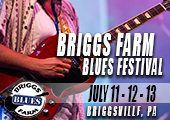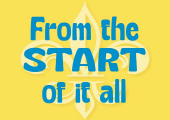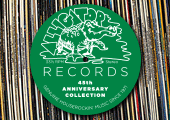BUDDY GUY
Born to Play the Blues
Silvertone/RCA – 88875-12037-2
In the blues world today, Buddy Guy stands on the mountaintop as the preeminent electric bluesman, and with Born to Play the Blues, he throws down a gauntlet challenging anyone to pick an axe and try to match the fire, intensity and power he delivers. This is a landmark album, his best, most focused, pure blues offering since Sweet Tea (2001). The crossover guests are kept to a minimum and, once again, producer Tom Hambridge crafts a great sounding recording.
So much of Born to Play the Blues is just the basic, searing, hard driving electric blues that Guy has been dishing out since he arrived in Chicago in the 1950s. There is the stripped down, slow, bravado filled title track that perfectly distills the essence of the postwar electric blues. There is the two-guitar (Guy plus slide man Rob McNelley) Back Up Mama that calls to mind Muddy Waters mid-1950s Chess recordings. Guy joins forces with McNelley, guitarist Doyle Bramhall III and B3 organist Reese Wynans and pulls out all the stops for the steamroller groove of Whiskey, Beer & Wine. The autobiographical Turn Me Wild features a merciless, frenzied wah-wah guitar attack.
Guy shifts gears for a few tracks. On Crying Out of One Eye, Wynan’s Wurlitzer piano and the Muscle Shoals horns give Guy a chance to tip his hat in the direction of soul blues legend Bobby Bland. The horns are back on Thick Like Mississippi Mud, their surging horn lines intertwining with Kevin McKendree’s pounding rock ’n’ roll piano and Guy’s searing guitar lines to create a propulsive R&B showcase. Unlike some of the crossover efforts of his recent recordings, the contributions by Guy’s guest stars keep the focus on the hardcore blues agenda. ZZ Top’s Billy Gibbons takes on Guy for the no holds boogie Wear You Out, trading smoldering solos throughout. Kim Wilson enables Guy to revisit the rocking harmonica/guitar duels that he played with longtime partner Junior Wells. Guy has some fun as he hooks up with singer Joss Stone to deliver some finger popping R&B in recreating the 1960 Brook Benton / Dinah Washington hit (Baby) You Got What It Takes. Dedicated to the late B.B. King, Flesh & Bone is a haunting duet with Van Morrison that has a powerful gospel feel thanks to Wynan’s B3 and background vocals from the McCrary Sisters. For the closing number, Come Back Muddy, Guy puts down his electric guitar, picks up a Martin acoustic and is joined by Bramhall on 12-string guitar and Wynans on upright piano for a heartfelt homage to Waters that recalls the classic 1964 Folk Singer LP (and Guy’s own 2003 Blues Singer CD). Clearly, with the dedication to King and the paean to Waters, Guy recognizes the position he has assumed in the realm of the blues and has accepted the scepter that has been passed to him. Born to Play the Blues is a late career masterpiece from a living legend.
— Robert H. Cataliotti
SHEMEKIA COPELAND
Outskirts of Love
Alligator – ALCD 4966
As Shemekia Copeland has expanded her stylistic scope in recent years, she has also evolved into a roots-Americana vocalist of subtlety and nuance, able to convey vividly drawn, even harrowing vignettes with the polished grace of a seasoned musical storyteller.
The stories she tells here are gripping, even if they’re sometimes leavened by ironically jaunty musical settings. The most notable in that regard is probably Cardboard Box, the story of a homeless couple given a bluesy starkness by the fretwork of guest guitarist Alvin Youngblood Hart that remains relentlessly up-tempo, even as Copeland and Hart trade vocals laced with bitter irony (“Life’s so simple in a cardboard box”) before Copeland delivers the coup de grace: “We all end up in a box, I just got mine first.” Devil’s Hand, by Copeland’s father, the late Johnny “Clyde” Copeland, is a blues-drenched meditation on fallibility and damnation on which Copeland summons an aura of stark terror, yet remains chillingly in control, as if determined to defeat Satan by sheer willpower. Drivin’ Out of Nashville brings a Keystone Kops–like cartoon slapstick to what should, by rights, have been a noir-ish tale of sexual harassment and cold-eyed payback; the title song, co-written by executive producer John Hahn, attains an almost cinematic vividness in its portrayal of wounded souls and night-stalking desperation, even as its propulsive, blues-rock arrangement imbues it with a dance-in-the-face-of-despair redemptive power—at least arguably, the very essence of blues expression.
Copeland is equally eloquent on more standard fare, whether reprising the Solomon Burke classic I Feel a Sin Coming On or revisiting Albert King’s Wrapped Up In Love Again. But the set’s standout is Crossbone Beach, a nightmarish tale of date rape and its devastating aftermath. Robert Randolph contributes a swirling, hallucinatory steel guitar break that all too eloquently invokes the protagonist’s feelings of emotional displacement and horror—but this is no victim’s sob-story: it’s a survivor’s anthem, maybe even a proclamation of victory, as Copeland’s ferociously ripped-out final verse makes clear.
This is Shemekia Copeland’s best album yet, and one gets the feeling it’s just the beginning of a new and important musical journey for her.
—David Whiteis
JOE LOUIS WALKER
Everybody Wants a Piece
Provogue – PRD-474
Joe Louis Walker came of age in the musical hotbed of ’60s and ’70s–era San Francisco, and the multiple influences he absorbed during those years—blues, soul, singer-songwriter folk, progressive rock, jazz, Gulf Coast R&B and more—permeate his music. Out of this stylistic cauldron he has forged a distinctive personal style, hard-charging yet musically textured, informed by lyric wit and straightforward emotional honesty.
Walker is one of the few contemporary guitarists who can invoke the pyrotechnic virtuosity of Hendrix without spewing clichéd barrages of distorted overkill. Even at his most furious, he delivers each note with care and precision (yes, he really does think that fast!) and the hard-pounding rhythms from drummer Byron Cage (lent both weight and texture by bassist Lenny Bradford and keyboardist Philip Young) are as propulsive as they are bombastic. Walker’s lyrics resonate with meaning, laced with enough acerbic irony to avoid self-pity and bathos on the one hand, and macho excess on the other.
Several of the outings here have echoes of New Orleans—most evident, perhaps, on Buzz on You, with its street-parade cadence and Longhair-like piano curlicues from Young. Man of Many Words, on the other hand, harks directly back to Otis Redding’s Hard to Handle; Walker also delves into impressionistic, pop-tinged blues-rock balladry (Black & Blue), thunderous updates of Delta-styled unison guitar leads and vocals (One Sunny Day) and blues-toughened churchy uplift (Gospel Blues, Wade In the Water). The closer, 35 Years, showcases Walker’s slide work, overlaid as usual with street-tough lyric imagery. It’s an appropriate finisher for another first-rate CD from this major contemporary blues artist.
—David Whiteis
GUY DAVIS
Kokomo Kidd
MC Records – MC-0078
This is New York foot-stomping roots blues on a New York label. Guy Davis hails from Harlem, and the other musicians are mostly from Woodstock. The album is even dedicated to some fine New Yorkers: his mom Ruby Dee and her good friends Pete and Toshi Seeger, folks Guy Davis grew up with. His youth wasn’t a typical blues story.
In the cover photo, Davis sits on the High Line in Manhattan, playing a beautiful red Silvertone f-hole guitar, looking smug and happy. This album features a familiar cast, an established sound and like most of his prior albums, a fine set of songs. Yet something here is different. It exudes magical joy, an album that radiates the happiness the musicians evidently had. At last, Guy Davis is free!
Everybody has their own burdens and their own paths. Some find the blues from the bottom and some from the top. Guy Davis came from African American privilege, almost nobility, from famous and highly respected parents—not the usual way to slide into country blues. How much easier it would have been for him to claim the blues if he had been destitute and struggling with the pangs of poverty, but he had to prove that he wasn’t handed anything, that he could earn his own respect and honor. On Kokomo Kidd Guy Davis is totally at ease with himself—carefree, self-confident and at peace with his art. He’s no longer trying. That’s not to say he’s careless, but that he can have fun without overthinking everything. He knows who he is. Whatever Guy Davis had to prove, to himself and the world, has been proven.
The CD contains a few true gems that establish Davis as an important songwriter and lyricist of considerable finesse, namely the title cut—the highlight of the album—a witty tale about a black man, a colorful character named Elmer “Kokomo” Kidd. Kokomo’s job was delivering coal to the White House with his horse cart more than a hundred years ago, during the Prohibition era. A unique pusher/pimp, he is fabled to have smuggled various contraband, including persons of both sexes for certain favors, into the White House, Capitol and Supreme Court. Davis also composed other fine tunes like Taking Just a Little Bit of Time, an upbeat ditty, and Blackberry Kisses.
After a long spell on Red House Records, this is Davis’ sophomore release on MC Records. Guy Davis’ musicianship has never stopped progressing. He’s a fine multi-instrumentalist who really shines on 6- and 12-string guitar, banjo and harmonica, plus keyboards and percussion. His harmonica prowess is showcased on Shake it Like Sonny Did, an opus dedicated to Sonny Terry. For Kokomo Kidd he lined up old friends from the Hudson Valley of New York, world-class players like Professor Louie on Piano and Hammond organ, John Platania on slide and electric guitar, Mark Murphy on bass and cello, Gary Burke on drums and Chris James on mandolin and rhythm guitar. He also brought on board harmonica aces Charlie Musselwhite and Fabrizio Poggi, from Italy, each on one cut. Ben Jaffe, of the Preservation Hall Jazz Band plays tuba on the cover song.
Lots of good stuff here. On Maybe I’ll Go he introduced a new set of lyrics over Mississippi John Hurt’s Richland Woman Blues, for which he thankfully credits the old master. The oddities include two Dylan-esque songs: She Just Wants to Be Loved, when the raspy voiced singer sounds distinctly like Bob Dylan in his recent period, followed by a cover of Lay Lady Lay. Peculiar is his selection of the over-covered Red Rooster Blues by Willie Dixon, with the help of Charlie Musselwhite, but even he is unable to lift it beyond the norm. The album closes with Donovan’s Wear Your Love Like Heaven, as to prove the point that Guy Davis is perfectly at ease with himself. He no longer needs to do what he thinks other people might like or approve of. He’s doing his own thing.
—Frank Matheis
ZAC HARMON
Right Man Right Now
Blind Pig Records – BPCD 5167
Jackson, Mississippi–native Zac Harmon began his musical career as a teenager, playing guitar for Sam Myers. Since then it’s taken him from Mississippi to Los Angeles, encompassing songwriting, production, session and film work along the way. Currently based in Dallas, the singer and multi-instrumentalist’s latest album also marks his debut for Blind Pig Records. Right Man Right Now is Harmon at his best: a smooth, polished sound grounded in traditional blues stylings, yet thoroughly modern in sensibility.
Harmon invites the listener to join him in Raising Hell; organist Lucky Peterson and guitarist Anson Funderburgh assist on the smoldering shuffle. Bobby Rush shares lead vocals and plays harmonica on Hump In Your Back, and its sexy, horn-soaked funk is a delight. Harmon’s burnished tenor and fluid fretwork infuse both the title track and Good Thing Found with assurance. Ball and Chain’s slow stomp is accented with glowing slide licks, while an extended, languorous guitar solo heightens the sultry atmosphere of Feet Back On the Ground. He tears into John Lee Hooker’s I’m Bad Like Jesse James with gusto, and gives Little Milton’s Ain’t No Big Deal On You a funky swing.
The album’s most powerful moments speak directly to modern times. Stand Your Ground is an eloquent response to the death of Trayvon Martin and an indictment of our current societal malaise (“I got no chip on my shoulder, I got no axe to grind / But still you got this fear that’s all in your mind”). Harmon laments the hardships and perils of life in Back of the Yards, the song’s danceable groove belying its grim subject matter. On the rousing Long Live the Blues, he acknowledges the roots of the art form (“It’s in my blood, the Mississippi mud”), calls out industry thievery (“They took my songs, they got ’em all wrong / Then they called it rock ’n’ roll”) and avows throughout that no matter what, “the blues is here to stay.”
By the sound of Zac Harmon’s Right Man Right Now, the future of the blues is in very good hands indeed.
—Melanie Young
MIGHTY SAM McCLAIN & KNUT REIERSRUD
Tears of the World
ACT – 9033-2
The news of Mighty Sam McClain’s death that was reported in LB #238 is made all the more sad for coming only weeks before the release of this new CD, which now stands as an epitaph.
In recent years, McClain had become a global artist through his collaborations with Iranian vocalist Mahsa Vahdat and Norwegian guitarist Knut Reiersrud who, along with his band, backs McClain on these Oslo sessions. The set starts off with Tears of the World, the first of two covers of Florida vocalist Robert Moore’s Blue Candle 45s from the early ’70s. In McClain’s hands, this is hard-hitting soul of the highest order. The other Moore song, like the title track by Willie “Little Beaver” Hale, is the joyous Wish I Had a Girl Like You. McClain also delivers the goods on Joe L. Carter’s Detroit blues classic Please Mr. Foreman (Hi, 1971) and switches gears smoothly to deliver country chanteuse Carlene Carter’s Too Proud, giving a powerful demonstration at a dead-slow tempo of how to emote without screaming. Another unexpected choice is the pop chestnut Que Sera, with McClain and Reiersrud alternating verses on the way to church. The two leaders contributed the remaining seven tracks, which allow McClain to excel at slow tempo again on Jewels and Promised Land, while offering touches of Brill Building pop on Apples and country on Somebody Help Me and working funk grooves on Living in the Key of G, Things Ain’t What They Used To Be and Friends.
Reiersrud hits the nail on the head when, in his brief notes, he repeats the mantra “nobody sings these songs like Mighty Sam McClain.” He could grab and hold your attention like few other singers, and, thanks to recordings like this, will continue to do so as the years go passing by.
—Jim DeKoster
ANDY T – NICK NIXON BAND
Numbers Man
Blind Pig Records – BPCD 5168
Guitarist “Andy T” Talamantez and vocalist James “Nick” Nixon already had distinguished music careers before meeting in Nashville in 2011. Numbers Man is their third release as the Andy T – Nick Nixon Band, and it’s another fine collection of their classically oriented amalgam of blues, R&B and soul.
With his throaty, yet warm vocals, Nixon makes the bad-luck blues Shut the Front Door sound like a party; guitarist Anson Funderburgh (who also produced the album) reels off tight solos here and on the earthy soul anthem Be Somebody Some Day. Jim Klingler’s steady drumming, Christian Dozzler’s dazzling stride piano and the piquant Texas Horns accent the peppery New Orleans R&B of Devil’s Wife. The romantic Deep Blue Sea, the breezy zydeco of Tall Drink of Water and What Went Wrong and the instrumental Hightailin’ are all made for the dance floor.
Andy T’s pinpoint fretwork and Larry van Loon’s funky organ give the roguish title track its strut; Kim Wilson unspools a mellifluous harmonica solo on the loping Sundown Blues. The band’s versions of Pretty Girls Everywhere, Blue Monday, Tell Me What’s the Reason and Gate’s Salty Blues hew closely to those by Eugene Church, Little Milton, T-Bone Walker and Gatemouth Brown, respectively.
Declaring that “love is the answer” for our troubled present-day society, This World We Live In wraps the session on a sober note.
For modern blues and roots rendered with cool vintage style, seek out Andy T – Nick Nixon Band’s Numbers Man.
—Melanie Young
JIMMY BURNS
It Ain’t Right
Delmark – DE 841
After 2011’s Stuck in the Middle for VelRone, veteran Chicago singer-guitarist Jimmy Burns is back with Delmark, for whom he previously released four CDs between 1996 and 2007.
The recording benefits immensely from the presence of Burns’ working band, featuring Anthony Palmer on second guitar, Greg McDaniel on bass and Bryant “T” Parker on drums, with Sumito Ariyoshi and Roosevelt Purifoy helping out on piano and organ, respectively, and a three-piece horn section arranged by trumpeter Marques Carroll added on four cuts. There’s only one Burns original on offer, the strutting Hard Hearted Woman, but Burns and producer Dick Shurman did such a great job of selecting cover material that the set sounds fresh throughout. There are two songs each from Billy Flynn and Percy Mayfield, along with the Little Walter title track and a funked-up take on Junior Wells’ Messin’ With the Kid. Equally strong, albeit obscure, are Snaggletooth Mule (f.k.a. Hoodoo Man) from Bobby Stone (DreaM, c.1960), Crazy, Crazy, Crazy from the 5 Royales (Apollo, 1957), Surrounded from Syl Johnson (Zachron, 1966), Rock Awhile from Goree Carter (Freedom, 1949) and I Know You Hear Me Calling from Larry Williams (Arhoolie, 1966). As if that’s not enough variety, Burns switches to harmonica for Jimmy Reed’s A String to Your Heart, offers his own interpretation of Ben E. King’s Stand By Me that segues smoothly into I Count the Tears, and he closes the set with a Wade In the Water that’s not the song usually associated with that title.
This set is living proof of the notion that a good cover beats a weak original. It just might be Burns’ best offering to date—and that’s saying a lot.
—Jim DeKoster
BEY PAULE BAND
Not Goin’ Away
Blue Dot Records – BDR CD108
Philadelphia vocalist Frank Bey and northern California guitarist Anthony Paule may have changed the name of their working partnership from Frank Bey with the Anthony Paule Band to the Bey Paule Band, but their winning mix of old-school southern soul and modern blues remains as vibrant as ever. The Georgia-born singer is in typically commanding form throughout the 11 vocal numbers, all but two of them penned by Paule, his wife Christine Vitale and/or various band members and other associates, including Tommy Castro on one. Bey’s baritone pipes are robust, although his range is somewhat limited. He makes up for it, however, by the passion he pours into his clearly enunciated readings of lyrics. And on the sockin’ soul song Kiss Me Like You Mean It, he employs rhythmic word repetition in the manner of Otis Redding, for whom he once worked as a driver.
Rooted in straight-ahead, electric blues styles, as well as Memphis soul picking in the Steve Cropper and Reggie Young traditions, Paule is featured playing obbligatos and soloing on the vocal tunes, as well as on an M.G.’s–inspired instrumental titled Noel’s Haze. He doesn’t hog all the solo space, however, leaving room for pianist/organist Tony Lufrano, trumpeter Tom Poole, trombonist Mike Rinta and tenor saxophonist Nancy Wright to improvise. Bassist Paul Olguin and drummer Paul Revelli anchor the bottoms firmly.
Most of the performances are rooted in classic Memphis soul and blues styles, particularly the Lufrano-penned Love and Happiness–like Ballad of the Loverman and the inspirational If I Could Reach Out, previously recorded by Otis Clay and composed by the late, great hit-maker George Jackson. Indeed, the Bey Paule Band may well be the finest currently active purveyors of Memphis soul not based in Tennessee.
—Lee Hildebrand
GARY CLARK JR.
The Story of Sonny Boy Slim
Warner Bros. – 2-550131
What with having major league management and being signed to a major label, it’s nary a wonder that Gary Clark Jr. has taken major moves down the pop path with his third full-length CD for Warner Bros. Records. His virtuosic guitar work retains its blues-bitten cutting edge, but the 13 original tunes on The Story of Sonny Boy Slim hardly resemble blues in form or feeling, with the notable exception of a loose, one-chord north Mississippi–style juke joint romp titled Shake.
Clark alternates between two voices—a thin tenor and a Prince-like high falsetto—and also plays bass, drums (programmed and maybe live at times) and keyboards on most selections, as well as a bit of Bob Dylan–style harmonica on one. His sisters, Shawn and Savannah Clark, supply backup vocals on three selections, and his girlfriend, model Nicole Trunfio, and their infant son, Zion Rain Clark, chime in briefly on Hold On, the funkiest song of the bunch. Other contributors include the three-man Hard Proof Horns, keyboardist Lewis Stephens, vocalist Tameca Jones, and, from Clark’s road band, guitarist King Zapata, bassist Johnny Bradley and drummer Johnny Radelat.
The songs are all very professionally produced—by Clark with help from engineers Bharath “Choppy Cheex” Ramanath and Jacob Scibra—and some may find favor with rock and R&B fans and radio programmers. Blues and rock guitarists will find much to marvel at, but blues aficionados are likely to be left with a cold, cold feeling.
—Lee Hildebrand



















